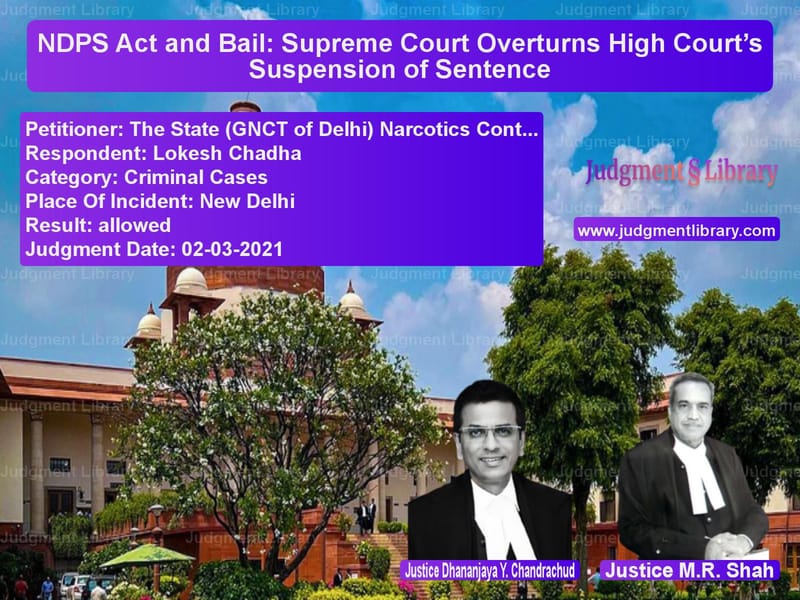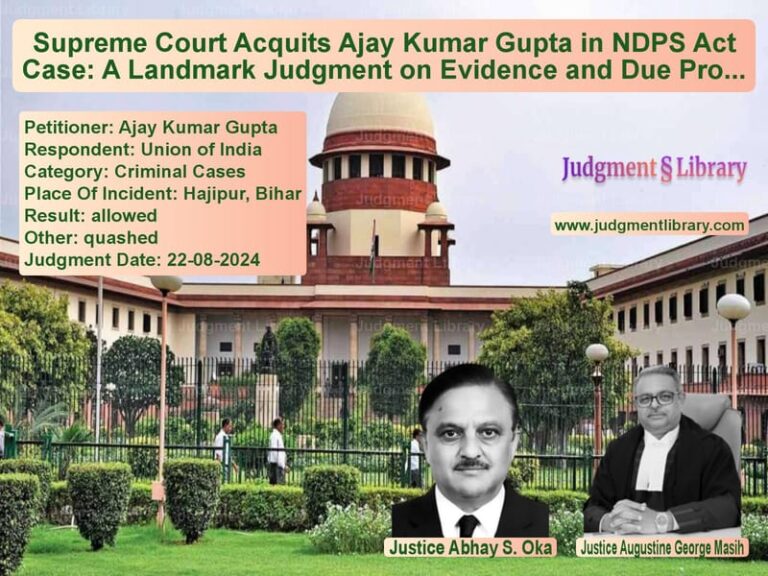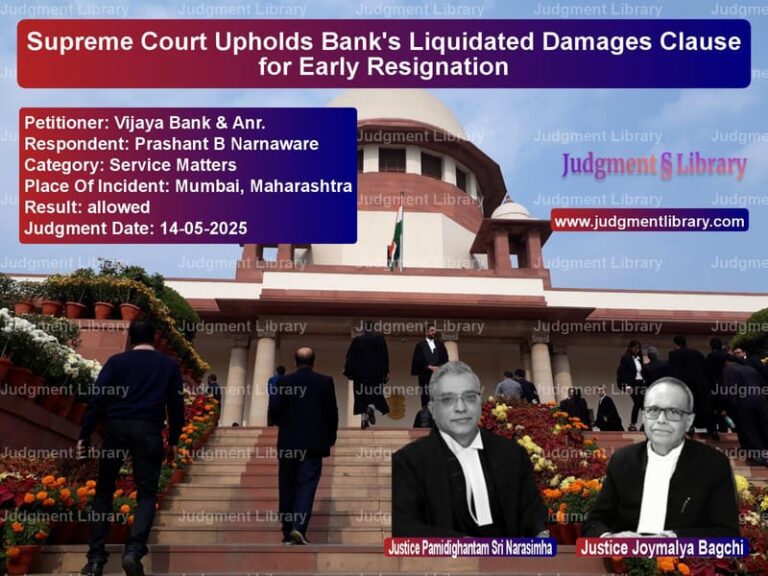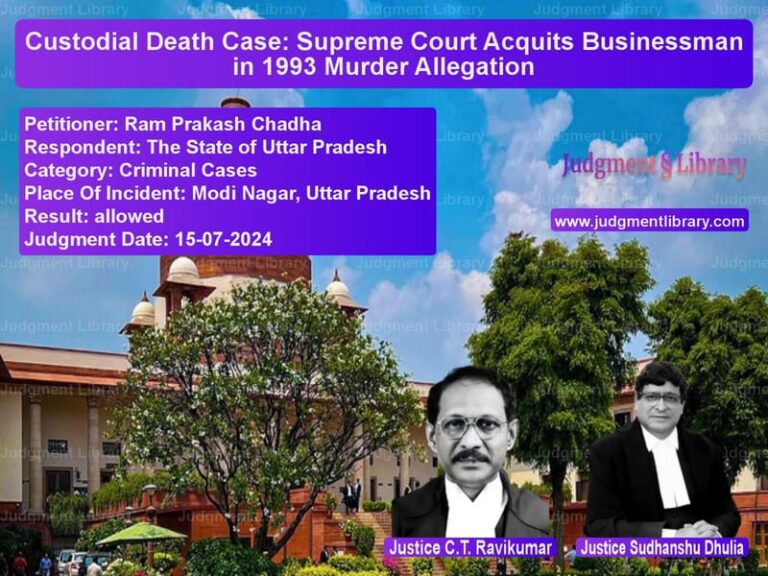NDPS Act and Bail: Supreme Court Overturns High Court’s Suspension of Sentence
The case of The State (GNCT of Delhi) Narcotics Control Bureau v. Lokesh Chadha raised crucial legal questions regarding the grant of bail and suspension of sentence under the Narcotic Drugs and Psychotropic Substances Act, 1985 (NDPS Act). The Supreme Court, in its judgment delivered on March 2, 2021, overturned the Delhi High Court’s decision that had suspended the sentence of the respondent, Lokesh Chadha. This ruling clarifies the stringent provisions under Section 37 of the NDPS Act concerning bail and suspension of sentences.
Background of the Case
The case originates from an incident on December 2, 2015, when the Narcotics Control Bureau (NCB), Delhi Zonal Unit, received information from DHL Courier regarding two suspicious parcels. Upon seizure and examination, the parcels were found to contain 325 grams of heroin and 390 grams of pseudoephedrine. The parcels were booked to a foreign destination by an employee of the respondent’s courier agency on behalf of a foreign national.
Read also: https://judgmentlibrary.com/legal-battle-over-cheating-and-assault-allegations-a-case-analysis/
The Special Judge convicted Lokesh Chadha under Sections 23(c) and 25A of the NDPS Act and sentenced him to 10 years of rigorous imprisonment under Section 23(c) and 3 years under Section 25A, along with a fine.
However, upon appeal, the Delhi High Court suspended the sentence of the respondent on July 28, 2020, pending final disposal of the appeal.
Arguments by the Petitioner (Narcotics Control Bureau)
- The High Court failed to consider the stringent requirements of Section 37 of the NDPS Act before granting bail.
- Section 37 explicitly states that bail cannot be granted unless the court is satisfied that there are reasonable grounds to believe that the accused is not guilty and will not commit further offenses while on bail.
- The trial court had already found the respondent guilty beyond a reasonable doubt, making it unlawful for the High Court to suspend the sentence without recording special reasons.
- The High Court’s order was based solely on the respondent’s time already served (4 years and 4 months) and the delays in appeal hearings due to COVID-19, which are not valid reasons under the NDPS Act.
Arguments by the Respondent (Lokesh Chadha)
- The High Court was justified in suspending the sentence considering the substantial time already served.
- The respondent’s role was limited to being the proprietor of the courier agency, and there was no direct evidence linking him to drug trafficking.
- The co-accused, who was an employee of the courier agency, was acquitted, raising doubts about the correctness of the conviction.
- Given the COVID-19 pandemic, the appeal hearing was unlikely to take place soon, and continued incarceration would be unjust.
Key Observations by the Supreme Court
The judgment, delivered by Dr. Dhananjaya Y. Chandrachud and M.R. Shah, made several key observations:
- The High Court failed to apply the strict provisions of Section 37 of the NDPS Act before granting suspension of sentence.
- “The Court must be satisfied that there are reasonable grounds for believing that the accused is not guilty of the offense and is not likely to commit any offense while on bail.”
- Suspension of sentence and grant of bail in NDPS cases should be based on the merits of the case and not on extraneous factors such as COVID-19 delays.
- The Special Judge had found the respondent guilty after examining all evidence, and the High Court did not provide any reasoning to override these findings.
- The principle that “bail is the rule and jail is an exception” does not apply post-conviction, as the presumption of innocence no longer holds.
Final Verdict
The Supreme Court ruled as follows:
- The Delhi High Court’s order suspending the sentence of Lokesh Chadha is set aside.
- The respondent is directed to surrender immediately to serve the remainder of his sentence.
- The High Court is requested to take up the pending appeal expeditiously and decide the matter by the end of 2021.
Implications of the Judgment
This judgment has significant implications for NDPS Act cases:
- It reaffirms the strict conditions for bail under Section 37, preventing courts from granting bail without fulfilling the statutory requirements.
- It ensures that convictions under the NDPS Act are not easily set aside without strong legal grounds.
- It sends a clear message that the judiciary must exercise extreme caution in suspending sentences for serious drug-related offenses.
- It upholds the sanctity of trial court decisions and restricts the ability of appellate courts to interfere without proper reasoning.
Conclusion
The ruling in Narcotics Control Bureau v. Lokesh Chadha is a crucial precedent in the enforcement of stringent bail provisions under the NDPS Act. It ensures that legal provisions meant to curb drug-related offenses are applied strictly, and convicts cannot exploit procedural delays to secure unwarranted relief. The Supreme Court’s intervention in overturning the High Court’s decision reaffirms its commitment to upholding the legislative intent behind anti-narcotics laws.
Petitioner Name: The State (GNCT of Delhi) Narcotics Control Bureau.Respondent Name: Lokesh Chadha.Judgment By: Justice Dhananjaya Y. Chandrachud, Justice M.R. Shah.Place Of Incident: New Delhi.Judgment Date: 02-03-2021.
Don’t miss out on the full details! Download the complete judgment in PDF format below and gain valuable insights instantly!
Download Judgment: the-state-(gnct-of-d-vs-lokesh-chadha-supreme-court-of-india-judgment-dated-02-03-2021.pdf
Directly Download Judgment: Directly download this Judgment
See all petitions in Drug Possession Cases
See all petitions in Bail and Anticipatory Bail
See all petitions in Judgment by Dhananjaya Y Chandrachud
See all petitions in Judgment by Mukeshkumar Rasikbhai Shah
See all petitions in allowed
See all petitions in supreme court of India judgments March 2021
See all petitions in 2021 judgments
See all posts in Criminal Cases Category
See all allowed petitions in Criminal Cases Category
See all Dismissed petitions in Criminal Cases Category
See all partially allowed petitions in Criminal Cases Category







